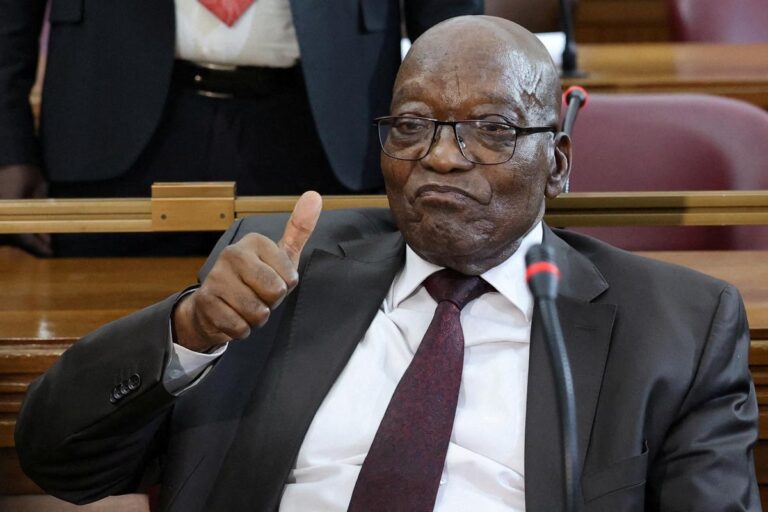The story so far: South Africa’s Supreme Court on Monday barred former President Jacob Zuma from running in the next election. Zuma was forced to resign as South Africa’s president in 2018 amid allegations of corruption. He was convicted of contempt of court in 2021 and sentenced to 15 months in prison, but only served two months. He is currently on trial for corruption allegations.
Zuma was a member of the African National Congress (ANC) when he was president of South Africa and was succeeded by Cyril Ramaphosa after his resignation.
Zuma’s comeback attempt and disqualification
In December 2023, Zuma announced that he would not vote for the ANC. He is now the leader of a new party called uMkhonto we Sizwe (MK) (Spear of the People), named after a former ANC paramilitary wing. In response, the ANC suspended him from the party. “Former President Jacob Zuma has actively attacked the integrity of the ANC and campaigned to remove it from power, yet claims he has not suspended his membership. This action goes against the spirit of institutional discipline and the letter of the ANC Constitution,” the ANC said in a statement announcing Zuma’s suspension in January 2024.
However, on 28 March, the South African Electoral Commission (IEC) announced that Zuma’s candidacy had been challenged and accepted. The IEC did not give any reasons but reiterated the eligibility requirements for presidential candidates, which state, among other things, that anyone who has been convicted of a crime and has served a prison sentence of 12 months or more cannot stand for election. Zuma’s 15-month sentence falls within this period.
A South African court has overturned Zuma’s disqualification from running for president. The court’s decision was challenged by the Electoral Commission, and on 20 May the Constitutional Court ruled in the commission’s favour, barring Zuma from running for office. The Electoral Commission had sought clarification on whether the Constitutional Court had the power to enforce section 47(1) of the Constitution, which states that “a person who has been convicted and sentenced to imprisonment for a term of 12 months or more without the proviso of a fine shall be ineligible to stand for election”. The South African Constitution also states that “the disqualification under this section shall expire five years after the completion of the sentence”.
What are the charges against Zuma?
Zuma was jailed for contempt of court after refusing to appear before an investigation into corruption allegations made during his nine-year presidency. After the former president was jailed in July 2021, riots erupted in South Africa, leaving more than 300 people dead. The riots by Zuma’s supporters first began in KwaZulu-Natal province and spread to other parts of the country, including Gauteng province, home to South Africa’s largest city, Johannesburg.
Zuma was released on medical parole two months later.
Zuma is also currently on trial for corruption charges in a 1999 arms deal, though the charges against him have been dropped and reinstated several times over the past two decades.
Shortly after leaving office in 2018, Zuma was indicted on corruption charges over a $2.5 billion state arms deal. Zuma, who was deputy president at the time of the deal, is accused of accepting bribes from a French defense equipment company through financial adviser Shabir Shaikh, who is himself serving a 15-year sentence for soliciting bribes on Zuma’s behalf in 2005. Shaikh was released on medical parole in 2009.
Apart from the arms deal, there are several corruption allegations against Zuma. The Gupta family, led by brothers Ajay, Atul and Rajesh (“Tony”) Gupta from Saharanpur in Uttar Pradesh, have been at the centre of many of the allegations against Zuma. In April 2023, the UAE rejected South Africa’s extradition request to bring the brothers back and prosecute them.
What do the polls say?
According to Gallup, the ANC could lose its majority in South Africa for the first time in 30 years since apartheid was abolished in 1994. The party has held a majority in the country since Nelson Mandela became president. In 2004 it won nearly 70% of the vote, but its vote share has declined since then. Corruption allegations, a worsening economic situation and rising unemployment are the main reasons South Africans are losing confidence in the ANC.
“If the ANC falls below 50 percent of the vote, the next election could be a turning point for the country, causing the party to lose its majority position and forcing negotiations to form a coalition government,” the study said.
The corruption charges against Zuma are not the only problem facing the ANC, with current President Ramaphosa also embroiled in numerous controversies, including allegations of fraud and violations of the constitution he helped write in the 1990s.
In June 2022, Arthur Fraser, a former national security chief and ally of former President Zuma, filed a criminal complaint against President Ramaphosa for failing to report the theft of between $4 million and $8 million in gold from the Palapala hunting grounds in the northeast in February 2020. The president instead ordered an informal investigation by members of his personal security unit. The scandal has been dubbed “Farmgate” by local media.
Another Ipsos poll, conducted through interviews in March and April 2024, found the ANC is struggling to retain voters. “Nationally, only 38% trust the ANC to deliver on its election promises, and the party’s support base has long been concentrated in rural areas,” the poll said.
South Africa will hold elections on May 29th.
(With input from relevant agencies)
This is a premium article available only to subscribers. To read over 250 premium articles every month,
You’ve reached your limit for free articles. Support quality journalism.
You’ve reached your limit for free articles. Support quality journalism.
You have read {{data.cm.views}} from {{data.cm.maxViews}} Free articles.
This is your last free article.

